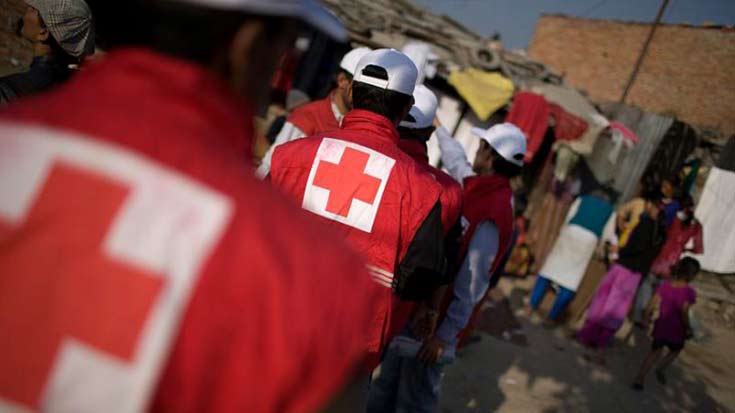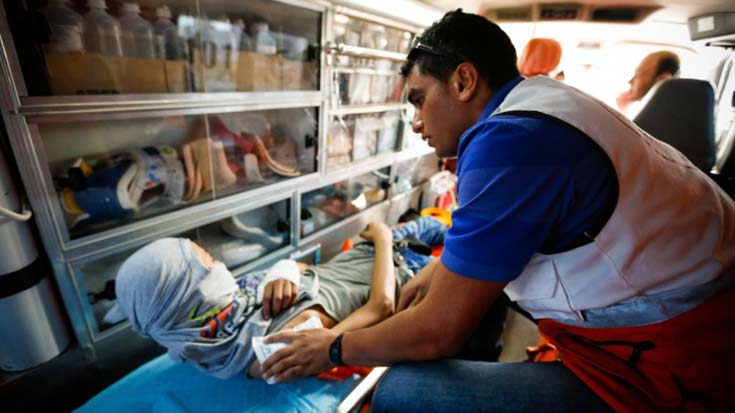A road map for protecting healthcare services in conflict zones
Dr Alexander Breitegger welcomes the adoption of Resolution 4 on protecting the delivery of healthcare, but there is more to be done.

Nepal Red Cross Society in action (photo: Tom Van Cakenberghe/onasia/IFRC)
The headlines from conflict zones tell the tale: hospitals are being bombed, doctors attacked, and healthcare facilities raided by combatants pursuing injured or sick members of opposing factions. This violence against healthcare services has the potential to undermine the founding principle of the Geneva Conventions: that there should be some humanity in war. Under these circumstances Resolution 4 on protecting the delivery of healthcare, adopted at the 32nd International Conference of the Red Cross and Red Crescent (ICRC), is very welcome indeed. It's a step forward, for two reasons:
We need to act, not just express concern
Nobody can deny that these attacks are alarming, and there has been no shortage of calls to protect medical services. But what we need most is concrete action. Resolution 4 recognises this need: it highlights the devastating short and long-term consequences of this violence and, more importantly, sets out a clear road map for protecting healthcare services.
Following on from the recommendations of the global consultation process carried out under the Health Care in Danger initiative, Resolution 4 calls for a range of measures. These include: Adopting and amending domestic legislation; factoring in the protection of healthcare services when conducting military and police operations; gaining a better understanding of the violence that affects the delivery of healthcare services; ensuring that healthcare personnel understand their legal and ethical obligations; making healthcare facilities more secure; and improving risk management and overall security for ambulance and emergency healthcare services – including those of national societies.
In addition, the resolution calls on states to fully and promptly investigate attacks against health-care personnel and facilities in order to prevent future violence, ensure accountability and address victims' grievances.
Co-operation is important
Resolution 4 also emphasizes the importance of cooperation to address the issues underlying these attacks and prevent them. It calls on states, the International Red Cross and Red Crescent Movement, the healthcare community and others to work together to implement practical measures that are adapted to the local situation and designed to prevent and address violence against patients and healthcare personnel, facilities and vehicles. Specifically, it calls on the Movement to continue supporting and strengthening the capacities of local healthcare providers, bearing in mind that they are often among the most affected by violence and therefore require specific attention.

West Bank, Ramallah: A Palestine Red Crescent Society volunteer provides essential first aid to an injured Palestinian. CC BY-NC-ND/ICRC/A Atta
Following the road map
Action and co-operation are central to the approach taken by the ICRC’s Health Care in Danger initiative. Under the initiative, efforts are being made to create spaces (‘communities of action’) where healthcare providers, professional associations, international and regional organisations, civil society, and religious and community leaders can come together to share good practices, approaches and lessons learnt, and even discuss and plan concerted action.
There has been progress already, for example, with such communities constituting around the objective of making healthcare facilities more secure and on developing internal risk management protocols and improving overall security for national societies' ambulance and pre-hospital services.
Dr Alexander Breitegger has been a legal adviser at the ICRC since February 2011. He holds a PhD degree from the University of Vienna as well as the European Master's Degree in Human Rights and Democratisation (EMA). Dr Breitegger is the author of Cluster munitions and international law: disarmament with a human face, published by Routledge. His other publications focus on international humanitarian law, international human rights law and international criminal law.
Dr Alexander Breitegger, 16/03/2016